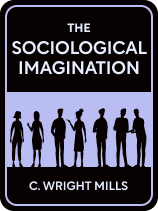

This article is an excerpt from the Shortform book guide to "The Sociological Imagination" by C. Wright Mills. Shortform has the world's best summaries and analyses of books you should be reading.
Like this article? Sign up for a free trial here .
What can social scientists do to improve their work? How can they do a better job of connecting personal and social problems?
In The Sociological Imagination, C. Wright Mills advocates for a different way of doing social science. Sociological imagination involves the development of one’s own methods, which Mills argues makes it easier to make a connection between personal and social problems. He believes that using sociological imagination can help social scientists more easily recognize their own bias, understand others’ perspectives, and maintain a broad scope.
Keep reading to better understand the three benefits of sociological imagination.
Using a Sociological Imagination
To use a sociological imagination, Mills argues that social scientists must develop their own methods and create their own work from beginning to end. A social scientist using sociological imagination not only connects other individuals’ lives to society—they must also connect their own lives to the society they live in. In other words, they must understand how their society informs the work they do. This means that social scientists can’t use the methods of others without question or create a partial work for someone else to finish. Instead, they must determine the methods that best connect personal and social problems and adopt them in their own work.
(Shortform note: Many critics note that Mills’s description of how to develop a sociological imagination is lacking and that it provides an ideal of what a social scientist should be without explaining how to achieve it. Some scholars argue that the answer of how to develop sociological imagination lies in the more personal and autobiographical nature of the book. They suggest that by explaining his own struggles and concerns with the social sciences, Mills shows how someone can develop sociological imagination: connecting their own life and beliefs to broader social concerns. From this perspective, developing sociological imagination requires internal reflection rather than a set of specific steps or guidelines.)
By developing original methods, a social scientist can improve their work in three ways. Let’s look at these three benefits of sociological imagination:
- Recognizing personal bias
- Understanding others’ perspectives
- Maintaining a broad scope
Benefit #1: Recognizing Personal Bias
Developing original methods helps a social scientist notice cultural biases that might otherwise lead to assumptions or oversights. As discussed above, the process of developing original methods requires a social scientist to connect their own life experiences and beliefs to those of the society they live in. This way, they’ll recognize when a particular belief or idea isn’t based on facts, but rather, on their own biases. Recognizing bias is crucial for good social science—unchecked bias can completely distort a work’s perspective on the connection between social and personal problems.
Example: An anthropologist is from America, a country with a strong tradition of written history, laws, and stories. He studies a culture with an entirely oral tradition and assumes that because this culture doesn’t use writing, it’s less intellectually and culturally developed. He then concludes that this lack of development is responsible for the culture’s social problems. But by adopting a sociological imagination, the anthropologist would recognize that his society is biased toward writing and that this doesn’t make his society intellectually superior. He then could approach his work with a more objective view that helps him better understand the culture’s social problems.
(Shortform note: While Mills argues that social scientists must avoid personal bias as much as possible, others argue that social scientists cannot do this—and shouldn’t even try. Sociologist Howard Becker suggests there’s no such thing as an objective, bias-free work of social science. Bias informs a social scientist’s work at the most fundamental level: For example, asking, “Why do victims stay in abusive relationships?” can lead to a completely different work than, “How do abusers prevent their partners from leaving?” Becker argues that instead of trying to be bias-free, works of social science should try to prevent distortion and oversights by clearly and rationally explaining what side they’re on, why they’re on it, and the potential limitations of their perspective.)
Benefit #2: Understanding Other Perspectives
Creating unique methods with a sociological imagination allows a social scientist to gain a greater understanding of other people’s perspectives. Connecting social problems to personal problems requires a social scientist to interact with individuals and learn about their lives. Then, by using specific social and historical examples, the social scientist can figure out not just what an individual believes but also why they believe it. This helps a social scientist understand other perspectives—understanding that they can use to improve their work.
Example: A sociologist studies crime with the assumption that people become criminals because of events in their personal lives—as a result, she judges criminals harshly. But by adopting a sociological imagination, she’s able to recognize that many people commit crimes because they grow up in cycles of violence or lack other opportunities—major social issues that inform these personal choices and circumstances. This helps her understand why individuals commit crimes, which she then can explain in her work.
(Shortform note: For an example of how some sociologists connect their work to personal perspectives, you can look to the “narrative sociology” movement. This approach attempts to create sociological work as a fictional or non-fictional story. Narrative sociologists argue that a detached style of analysis is less effective at communicating the experiences or circumstances of individuals, while a narrative approach can simultaneously tell more personal stories and use them to find broader social truths. Example: Social anthropologist Philippe Bourgois’s work In Search of Respect uses anecdotes about Bourgois’s friendships with drug dealers and their lives to support the book’s broader observations on crime, poverty, and inequality.)
Benefit #3: Maintaining a Broad Scope
Developing unique methods with a sociological imagination also ensures that a social scientist’s work maintains a proper scope. Since sociological imagination focuses on society-wide problems, it ensures that a social scientist will study problems that affect lots of people. This is important because work that only applies to a few individuals isn’t effective at preserving a free society. Mills’s definition of freedom requires people to understand large-scale social problems—so if a work of social science doesn’t illuminate anything about these problems, it doesn’t help preserve freedom.
For example: In 2008, an economist was studying why his brother’s pizza shop went out of business. The research was so specific that it only helped the economist’s brother contextualize his personal problems. But by adopting a sociological imagination, the economist instead studied the effect of the 2008 financial crisis on the restaurant industry as a whole. As a result, he helped many more people understand the connection between their personal problems and larger social problems—and did a better job preserving freedom.
(Shortform note: While Mills argues that social science should preserve freedom by applying broadly to as many people as possible, others argue that social science contributes more to a free society when it applies specifically to oppressed peoples. These “liberation” sociologists like Alvin Gouldner (The Coming Crisis of Western Sociology) argue that to truly work toward a free society, social scientists must create works that expose the oppression of minority groups and “liberate” the oppressed—and any other social science passively participates in this oppression.)

———End of Preview———
Like what you just read? Read the rest of the world's best book summary and analysis of C. Wright Mills's "The Sociological Imagination" at Shortform .
Here's what you'll find in our full The Sociological Imagination summary :
- C. Wright Mills's theory of how social science can preserve freedom
- What grand theory is and how it's flawed
- How social science based entirely on empirical evidence harms freedom






